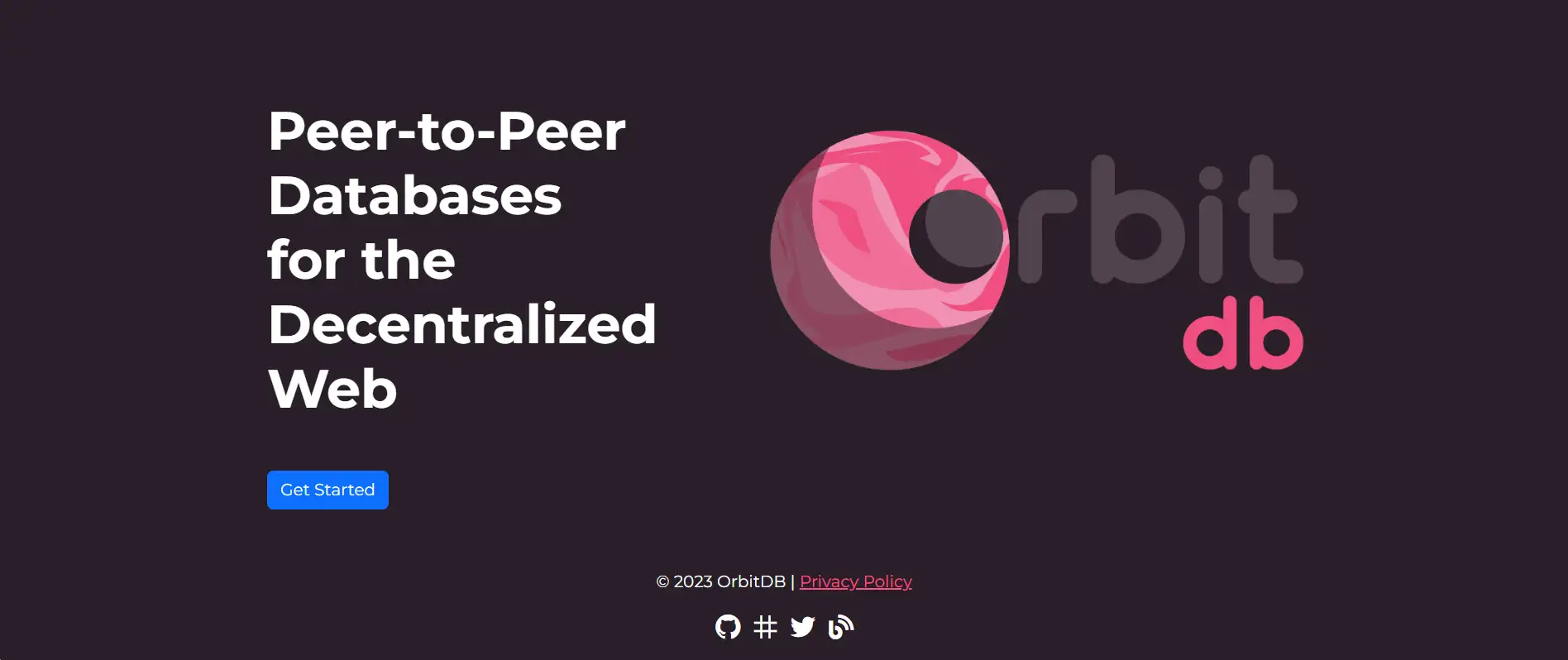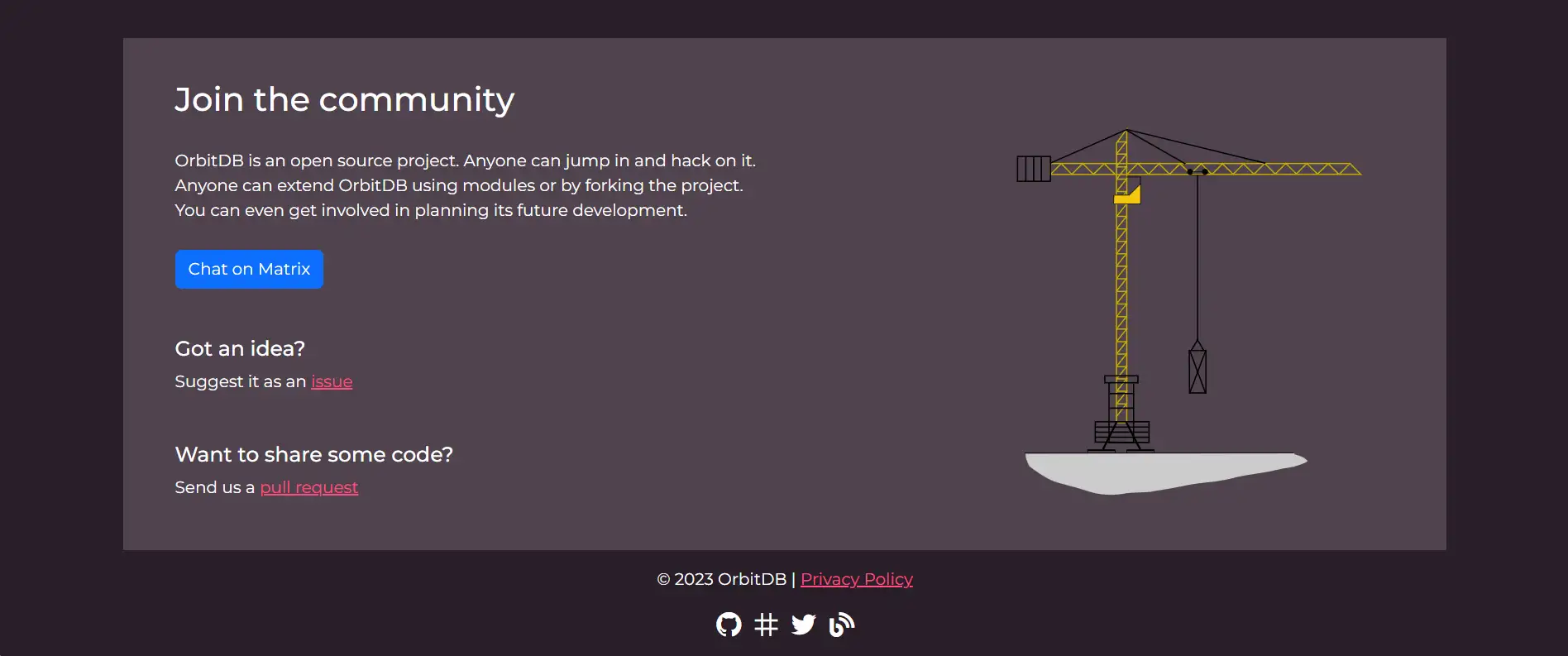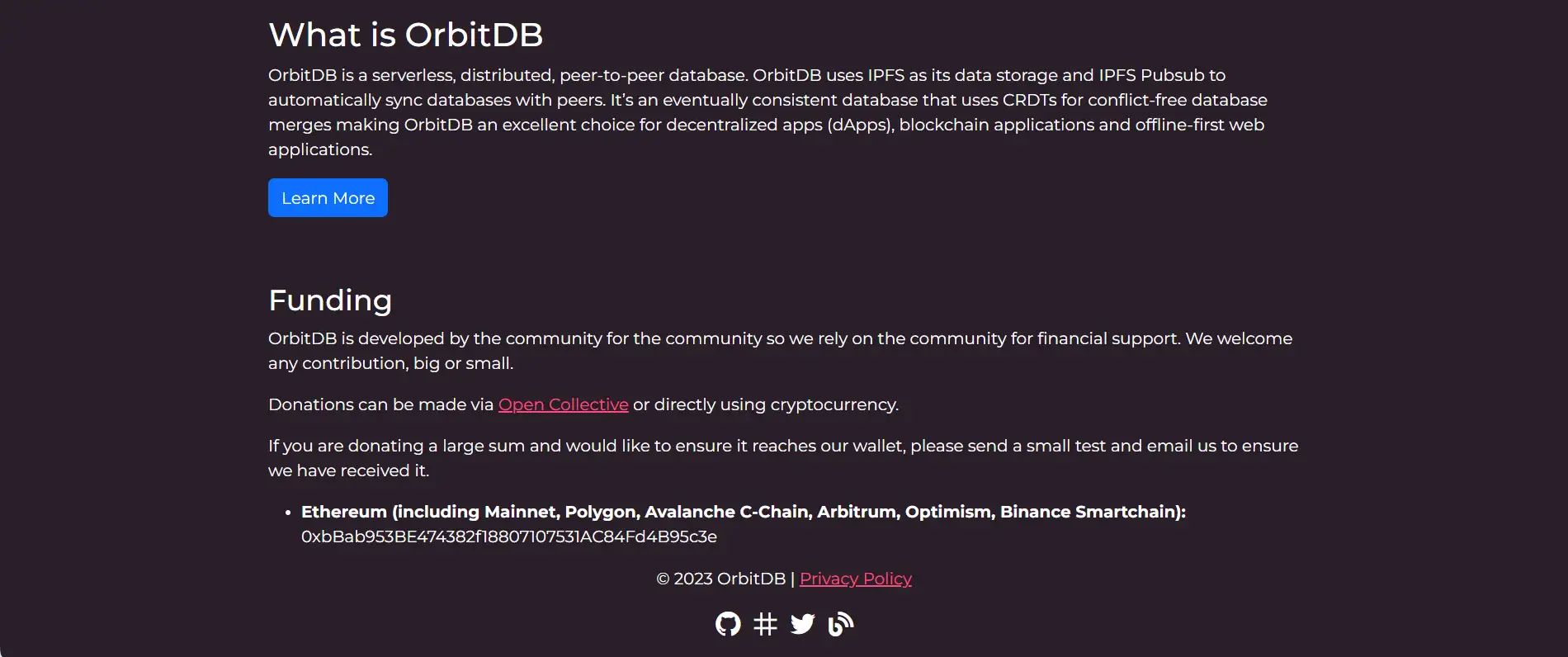About Orbit DB
OrbitDB is a pioneering peer-to-peer database system designed for the decentralized web, enabling users to build serverless, censorship-resistant applications with full control over data and privacy. Leveraging IPFS for data storage and IPFS PubSub for real-time sync, OrbitDB provides a robust foundation for developers seeking distributed, offline-capable solutions that don’t rely on centralized servers.
Whether you're developing decentralized applications (dApps), blockchain platforms, or offline-first applications, OrbitDB introduces a new paradigm in data management. By integrating CRDTs (Conflict-free Replicated Data Types), OrbitDB ensures eventual consistency and smooth data merging across peers — a necessity in decentralized environments where real-time consistency isn’t guaranteed.
OrbitDB emerged from the vision of creating a fully decentralized, secure, and private alternative to traditional client-server database models. At its core, OrbitDB eliminates the need for central authorities by enabling peer-to-peer data exchange through the InterPlanetary File System (IPFS). This approach empowers developers and users to build platforms that are inherently resistant to censorship, downtime, and data ownership concerns — foundational goals in the age of Web3.
Since its inception, OrbitDB has evolved rapidly. The current major release, version 3, is a feature-complete offering that supports a variety of database types, including key-value stores, feeds, counters, documents, and event logs. Each database is automatically synced across peers using IPFS PubSub, making it especially suitable for offline-first applications where connectivity may be intermittent but data accuracy is still paramount.
The latest roadmap emphasizes improved support for third-party developers, reflecting OrbitDB's ambition to become the default data storage layer for all decentralized applications. Several major projects are underway, including a complete React Native integration for mobile developers, browser-based web panels for database management, and “Mission Control” — a comprehensive command-line and UI dashboard for managing OrbitDB nodes and databases akin to MySQL Workbench or IPFS Kubo.
A significant differentiator for OrbitDB is its strong commitment to openness and community-led development. As an open-source project, OrbitDB thrives on contributions from developers worldwide. The project welcomes suggestions, bug reports, code submissions, and even new feature proposals via GitHub and its growing Substack blog community at orbitdb.substack.com.
Key enhancements in development include support for smart contract-based access control — enabling on-chain validation of who can replicate or append to databases — and a full Golang implementation for native deployment flexibility. OrbitDB’s Voyager daemon is also approaching production readiness, enabling 24/7 database availability with encryption support, a milestone for projects requiring persistent decentralized storage.
In the broader landscape, OrbitDB competes with solutions like GUN (a decentralized graph database), Ceramic Network (a decentralized data stream protocol), and Hypercore Protocol. However, OrbitDB’s tight integration with IPFS, modular architecture, and CRDT-based data syncing offer distinct advantages in reliability, flexibility, and peer autonomy.
OrbitDB delivers a powerful suite of features and benefits that position it as a top choice for developers building decentralized, serverless systems:
- Peer-to-Peer Architecture: No servers, no central authority. All data is shared and replicated between peers, ensuring decentralization and data resilience.
- CRDT-Based Synchronization: Enables conflict-free merging of data across peers with eventual consistency, perfect for distributed environments.
- Integrated with IPFS: Uses IPFS for secure, immutable data storage and IPFS PubSub for real-time syncing of changes.
- Offline-First Capabilities: Apps can read, write, and cache data offline — syncing automatically when connectivity resumes.
- Smart Contract Access Control: Upcoming support for on-chain validation of database permissions adds a layer of programmable access control.
- Modular Database Types: Offers feeds, documents, key-value stores, event logs, and counters — extensible by developers.
- Community-Driven & Open Source: Anyone can contribute, extend, or fork OrbitDB to suit their project’s needs.
Getting started with OrbitDB is straightforward, especially if you're familiar with JavaScript, IPFS, or peer-to-peer architectures:
-
Install OrbitDB: Use npm or yarn to install OrbitDB:
npm install orbit-db. You must also install and configure an IPFS node, such as js-ipfs or Helia. - Initialize IPFS & OrbitDB: Once your IPFS node is up, import OrbitDB and create an instance using the IPFS object.
- Create & Use Databases: You can create different types of databases (e.g. docstore, log, feed) depending on your data model. Use APIs to add, edit, or replicate data.
- Explore Examples: Browse the official GitHub examples or community-built projects like orbitDB-react-native for real-world usage patterns.
- Try the Web UI: A browser-based UI is available for non-technical users who want to experiment with OrbitDB without code.
- Fund the Project: OrbitDB is community-funded. Consider donating via Open Collective or crypto to help sustain development.
- Contribute: Submit issues, suggest features, or send pull requests on the official GitHub repo.
- Stay Updated: Follow updates via the official blog on orbitdb.substack.com and join discussions on Matrix and other open channels.
Orbit DB FAQ
In OrbitDB, your data is stored on IPFS — a distributed content-addressable file system. This means that your database entries live across the IPFS network, and are cached by peers who interact with the same database. There’s no central server—your data lives where it’s needed and replicated between peers automatically.
Yes, OrbitDB is designed with an offline-first architecture. You can run an OrbitDB node locally without needing a remote server. All writes and reads will be performed locally and then synced once a connection to other peers is re-established. This makes it ideal for local-first applications that need offline capability with eventual peer sync.
OrbitDB uses a CRDT-based model which ensures eventual consistency. When a node reconnects after being offline, it exchanges change histories using IPFS PubSub and merges data using CRDT algorithms. This means even if multiple users made changes offline, they’re automatically reconciled when back online—no central conflict resolution required.
CRDTs (Conflict-free Replicated Data Types) allow OrbitDB to merge data from multiple peers without requiring locking, sequencing, or a central authority. In a decentralized system, it's essential to allow concurrent updates and then resolve them deterministically across nodes. CRDTs make that possible, ensuring consistency and scalability in peer-to-peer environments.
Mobile support is a growing priority for OrbitDB. While the current implementation is focused on web and Node.js, the community is actively working on React Native support through projects like orbitDB-react-native. The roadmap includes mobile-ready builds and APIs so developers can integrate OrbitDB into native and hybrid mobile apps soon.
You Might Also Like












